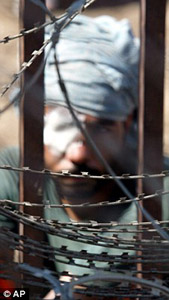Pakistani truck driver Umran Khan spent nine years in Afghanistan's Bagram prison, where he says he suffered beatings, sleep deprivation and a sustained campaign of mental disintegration despite committing no crime.
Accused with a friend of transporting bombs in 2005, he has maintained his innocence - and an official record shows his captors suspected the same.
Now the 32-year-old, one of six Pakistanis released last November, has spoken out against his treatment at Bagram in a case that rights groups say underlines the need for more scrutiny of the prison.
Opened in 2002, it has often been compared to Guantanamo Bay. The Afghan authorities took over the jail, renamed Parwan, last year. But the US remains in charge of foreigners, including about 34 Pakistanis.
Mustafa Qadri, Pakistan researcher for Amnesty International, said the case "demonstrates the persisting secrecy surrounding US detention policies".

This image from Abu Gharib in Iraq in 2004 demonstrate the horrible conditions and human rights abuses that have taken place there. The Red Cross found prisoner homicides, hoodings, sexual humiliation and torture had all taken place there. (Photo: AP)
He added: "It is a significant problem, given cases like this where individuals with no apparent involvement in hostilities happen to be in the wrong place at the wrong time."
Detainees at Bagram had no access to lawyers. Prisoners' records were released following a freedom-of-information request by the American Civil Liberties Union in 2009.
Khan's ordeal began in the restive northwestern Pakistani city of Peshawar, where he and his friend had travelled from Khyber tribal district to visit a cousin in hospital. They met two Afghans, "Saifoo" and "Lalzir", who had taken their sick grandmother to the same facility.
The men became friends and the Afghans promised the Pakistanis a sightseeing tour in the eastern Afghan province of Nangarhar and the chance to pick up some informal work.
After days of waiting, Khan said he decided to take a bus back to Pakistan, but Saifoo and Lalzir insisted that they accompany their guests in a taxi.
The car was searched at a checkpoint by the Afghan army and detained.
The two Afghans were later freed, but Khan and his friend were taken to a US base and questioned about explosives found in the car's boot.
A few days later, he was taken to Bagram airbase and given a new identity - prisoner ISN 2422.
Khan's file tells of a man with a consistent account of events who cannot be linked forensically to the explosives in the car and with no known connections to militant groups.
The US investigation concluded that "based upon the evidence and testimony ... the continued internment of (Umran) is not necessary" and noted the "strange" circumstances surrounding his capture.
Despite being given a low threat assessment, Khan says his captors held him in solitary confinement and regularly subjected him to sleep deprivation.
A US defence spokesman declined to comment on the details of the case, but said they did not tolerate the abuse of detainees.
Khan said that last November, as he left Bagram, a US colonel apologised to him.
"I replied, 'Why do you ask forgiveness after nine years and after destroying our lives? Didn't I tell you I'm innocent all along?'" Khan said.
"He just said, 'Forgive us. You were right.'"



